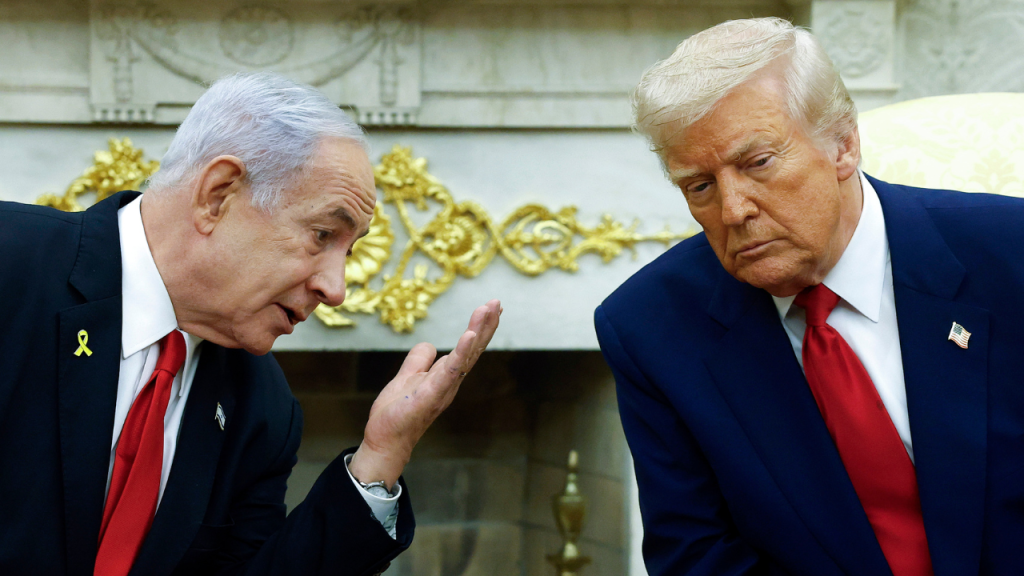Trump’s Gaza Peace Plan: A Turning Point for Netanyahu and the Middle East
In a bold diplomatic move, President Donald Trump has unveiled a 20-point peace plan that could potentially end the devastating Gaza conflict that has raged for nearly two years. The proposal, which Israeli Prime Minister Benjamin Netanyahu has already accepted, aims to secure the release of 46 hostages still held by Hamas, disarm the militant group, and rebuild Gaza under Palestinian governance with international oversight. While this plan could be Netanyahu’s “crowning achievement” as Trump suggested, it also places the Israeli leader in a precarious political position that could determine his government’s survival.
Netanyahu’s coalition government has been on shaky ground for months. After narrowly surviving a push for early elections in June, his government lost its parliamentary majority in July when two parties withdrew from his coalition, leaving him with just 50 of the 120 seats in the Israeli parliament. This vulnerability has been exacerbated by growing fractures within his own party, where hardline members are threatening to collapse the government over any perceived concessions in the war against Hamas. Finance Minister Bezalel Smotrich condemned Trump’s plan as a “resounding diplomatic failure,” while National Security Minister Itamar Ben-Gvir, who briefly resigned earlier this year over opposition to a previous ceasefire deal, has made no secret of his desire to see Gaza annexed with Israeli settlements. These hardliners view Trump’s proposal, which blocks Israeli annexation plans and offers Hamas members amnesty if they disarm, as a betrayal of the goal of “total victory” they had envisioned.
The political challenges facing Netanyahu extend beyond his coalition partners to the Israeli public, where his approval ratings have plummeted. Many Israelis have questioned whether Netanyahu has prioritized military operations—and perhaps his own political survival—over the return of hostages who have been held captive for 725 days. Security expert John Hannah noted that rejecting Trump’s plan would have been “disastrous” for Netanyahu, given Israel’s growing international isolation and Trump’s greater popularity among Israelis than Netanyahu himself. “It’s absolutely imperative for Israel’s long-term security and, frankly, for Netanyahu’s political future to keep the U.S. and Trump on side,” Hannah explained. Opposition leader and former prime minister Yair Lapid has expressed concern about Netanyahu’s potential “yes, but” approach—publicly accepting the plan in Washington while undermining it upon returning home to appease his political base.
The plan itself represents a significant compromise from the hardline positions some in Netanyahu’s government have advocated. While it does not explicitly pave a path for Palestinian statehood, it envisions a demilitarized Gaza under Palestinian governance, supervised by an international coalition led by Trump. If both sides accept the proposal, hostages could be returned within 72 hours, followed by a permanent ceasefire and the withdrawal of Israeli forces. Hamas would be required to disarm and surrender, with some members granted amnesty and safe passage out of Gaza. The proposal also includes provisions for Gaza’s reconstruction and deradicalization, alongside potential normalization of relations between Israel and Saudi Arabia—a diplomatic prize that has long eluded Israeli leaders.
Despite the political risks for Netanyahu, there are signs that the plan could garner broader support across the Israeli political spectrum. Benny Gantz, leader of the Blue and White Party, has backed Netanyahu’s agreement to the plan, stating his party “would not allow petty politics to sabotage the plan.” Richard Goldberg of the Foundation for Defense of Democracies argued that “from a principles perspective, this would be a clear Israeli victory,” noting that the requirements for demilitarization and deradicalization in Gaza align with Israel’s security interests and war objectives. The proposal represents a rare moment where pragmatic considerations might overcome ideological differences, with even opposition leaders recognizing the opportunity to end a conflict that has claimed thousands of lives and destabilized the region.
The ultimate success of Trump’s peace plan now hinges on Hamas’s response and Netanyahu’s ability to navigate the treacherous waters of Israeli politics. If Hamas agrees to the terms and hostages are returned, Netanyahu could experience a dramatic shift in public opinion. However, if the plan falls apart or if Netanyahu appears to undermine it through subtle obstructions, he may face renewed calls for early elections that polls suggest he would likely lose. As the region holds its breath, this moment represents not just a potential turning point in the Gaza conflict but possibly the final chapter of Netanyahu’s long and controversial leadership of Israel. The coming days will reveal whether this opportunity for peace will be seized or whether the cycle of violence will continue, with profound implications for all involved parties and the broader Middle East.


